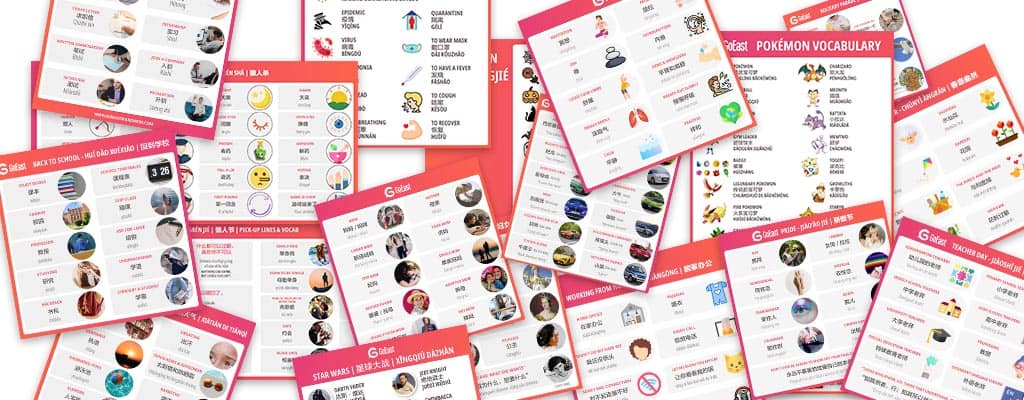A self introduction in Chinese can go a long way when you’re trying to make a good first impression on Chinese speakers. Whether you’re meeting a potential business partner or greeting a stranger at a cafe, knowing how to introduce yourself in Chinese can demonstrate courtesy, respect, and your awareness of cultural differences.
Being able to say hello in Chinese will help you start a conversation when visiting China. This would, of course, mean that you would have to know some Chinese to further continue speaking with the people you meet. Is Chinese hard to learn? Yes, but you don’t have to be fluent to make a short, lasting introduction in Chinese.
If you want to learn how, check out this list of Chinese introduction phrases below.
Phrase List: How to Introduce Yourself in Chinese
| English | Pinyin | Chinese |
| Hello. (casual) | Nǐ hǎo. | 你好。 |
| Hello. (respectful) | Nín hǎo. | 您好。 |
| Good morning. | Shàngwŭ hǎo. | 上午好。 |
| Good afternoon. | Xiàwŭ hăo. | 下午好。 |
| Good evening. | Wǎnshàng hǎo. | 晚上好。 |
| I don’t speak Chinese. | Wǒ bù huì shuō zhōngwén. | 我不会说中文。 |
| I speak a little Chinese. | Wǒ huì shuō yī diǎn zhōngwén. | 我会说一点中文。 |
| What’s your name? | Nǐ jiào shénme míngzi? | 你叫什么名字? |
| My name is [name]. | Wǒ jiào [name]. | 我叫[name]。 |
| May I please have your family name? | Qǐng wèn, nín guì xìng? | 请问,您贵姓? |
| My family name is [family name] | Wǒ xìng [family name]. | 我姓[family name]。 |
| Where are you from? | Nǐ shì nǎlǐ de? | 你是哪里的? |
| I’m from [place]. | Wǒ shì [place] de. | 我是[place]的。 |
| What do you do for work? | Nǐ zuò shénme gōngzuò? | 你做什么工作? |
| I’m a [profession]. | Wǒ shì [profession] | 我是[profession]。 |
| I’m in college. | Wǒ shàng dàxué. | 我上大学。 |
| What do you like to do? | Nǐ xǐhuān zuò shénme? | 你喜欢做什么? |
| I like [activity]. | Wǒ xǐhuān [activity]. | 我喜欢[activity]。 |
| I like watching TV. | Wŏ xĭhuān kàn diànshì. | 我喜欢看电视。 |
| I like sports/exercise. | Wǒ xǐhuān yùndòng. | 我喜欢运动。 |
| How is/are [topic]? | [Topic] zěnme yàng? | [topic]怎么样? |
| How is work? | Gōngzuò zěnme yàng? | 工作怎么样? |
| How is your family? | Jiārén zěnme yàng? | 家人怎么样? |
| May I give you my phone number? | Kěyǐ gěi nǐ wǒ de diànhuà hàomǎ ma? | 可以给你我的电话号码吗? |
| It’s nice to meet you. | Hěn gāoxìng rènshi nǐ. | 很高兴认识你。 |
No matter what level you’re at, as you go through the list, try to work on your Chinese pronunciation. Many Chinese sounds can be tricky for English speakers to imitate, even though pinyin makes Chinese look like it uses familiar sounds. Try to find recordings of native speakers (or speak with a native speaker in person) to hear what these common phrases sound like, and get used to saying them as naturally as you can.
All of this practice will come in handy when it comes time for you to land your introduction and make a solid impression in a real situation.
Learning Chinese Vocabulary to Introduce Yourself
To remember how to introduce yourself in Chinese, learn Chinese vocabulary with Hack Chinese. Hack Chinese platform makes studying Chinese much easier by helping you learn and review vocabulary as efficiently as possible. It will schedule when and how often you need to revisit words and phrases to refresh your memories of them, allowing you to stock your brain with useful information while you spend your study time more wisely.
Once you’ve spent some time studying and getting comfortable with these phrases, it’s time to get out there and practice! Keep in mind that making mistakes is a part of the learning process, and that even if the conversation with your new acquaintance ends up switching to English after your Chinese introduction, you’ve already made a memorable impression.
At the very least, you’ve proved to them that you cared about meeting them enough to learn how to introduce yourself in Chinese. You’ve put in the effort to step outside of your comfort zone and familiarize yourself with unfamiliar language and culture. Great job! That’s not such a bad first impression to make!




